Nearly 500 logistics professionals participated in our annual salary survey, and as in years past, the top priority for them remains “a feeling of accomplishment.” However, rumblings of discontent were also voiced about stagnant earnings. Our analysts at Peerless Research Group (PRG) further note that qualified, younger survey respondents are more likely to be “looking for a better opportunity” than ever before.
“Getting an annual raise of 2.7% is acceptable for the older, more experienced managers,” says PRG research director Judd Aschenbrand. “However, we see that among the youngest players—35 years or less—that acceptable raise number is 7%. It’s also interesting to see that salaries for women in this workforce are finally beginning to show impressive growth.”
Overall, those respondents in the 55-year and up range are in the “sweet spot” in the salary overview and are less likely to make a move. A precipitous drop in compensation was evident in the top tier in 2018 ($150,00 to $250,000), but this doesn’t alarm Aschenbrand.
“Executives at the high-end of the spectrum represent a small percentage of our survey and usually have a more complicated bonus and commission agreement with their companies,” says Aschenbrand. “We were more intrigued by the fact that salaries tended to dramatically drop when these executives moved too often from one company to another, which explains why only 3% of our respondents did so.”
It’s also important to note that being savvy at social networking and being a digital “native” are no longer simply options for young people seeking careers in logistics management—it’s now essential.
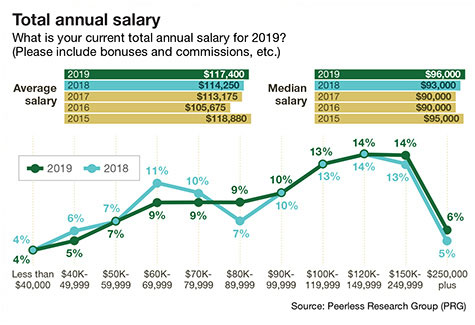 Again this year, the findings build on the importance of social networking and personal connections. By far, the single biggest factor for advancing careers was identified as “personal or social networking” (52% of respondents). On the list of areas of expertise that would advance their careers, we see many “soft” social skills at all salary levels except $50,000. At this lower salary bracket, respondents focused more on education and technical skills.
Again this year, the findings build on the importance of social networking and personal connections. By far, the single biggest factor for advancing careers was identified as “personal or social networking” (52% of respondents). On the list of areas of expertise that would advance their careers, we see many “soft” social skills at all salary levels except $50,000. At this lower salary bracket, respondents focused more on education and technical skills.
Of course, an overall understanding of technology and analytics continues to figure prominently at every salary level in terms of how to improve pay level and job position. E-fulfillment and e-commerce experience appeared at middle- and higher-level salary brackets for how to improve pay or job position, while sales and related “soft,” inter-organizational skills are prominent in the higher-level salary brackets.
Curiously, compared to past years, international trade figures less prominently as an important factor for promotion or career advancement, although it’s still evident.
Respondents say: “Stay engaged”
We interviewed scores of survey respondents this year as we worked to put context around the findings. While those we interviewed generally agreed with what the data revealed, a particular theme that emerged in our discussions was the importance of “staying engaged” while constantly searching to re-invent yourself and your logistics career on your way up the ladder.
Dan Bolzenius is the supply chain manager for Sysco at their corporate office in Houston, a position he’s held for the past six years. His current area of focus in on negotiating transportation contracts with Canadian suppliers for inbound deliveries of food products ultimately destined for restaurants, healthcare facilities and hotels. “One of the advantages of working from the company headquarters is that I’m given the authority to get jobs done as I see them,” he says. “But it requires a lot of experience, and a broad understanding of the supply chain.”
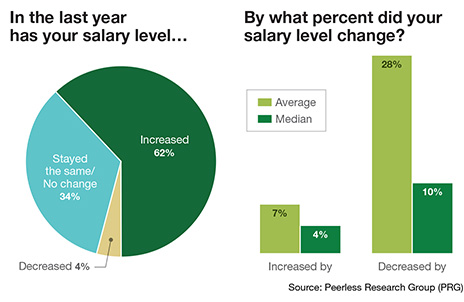 His advice for younger people seeking the same career path is to “volunteer” whenever there’s an opportunity to learn more about the business. “Don’t stand around and wait for recognition,” says Bolzenius. “If there’s a team having trouble with inventory control, for example, offer to give them your help. That’s also true of most other functions in logistics management.”
His advice for younger people seeking the same career path is to “volunteer” whenever there’s an opportunity to learn more about the business. “Don’t stand around and wait for recognition,” says Bolzenius. “If there’s a team having trouble with inventory control, for example, offer to give them your help. That’s also true of most other functions in logistics management.”
That message was certainly not lost on one young man we contacted. A lengthy and arduous job search was not in the cards for Jack Pankow, an industrial engineer intern charged with distribution and warehouse logistics for Mohawk Industries, an American flooring manufacturer based in Calhoun, Ga.
While still completing his degree at Kennesaw State University, he was contacted by Mohawk and invited in for an interview, he recalls. “It involved a bit of luck, and I didn’t have to send out a million resumes and get a lot of ‘no’ responses,” says Pankow. “When I graduate, I hope to move up into a position with still more challenges, but for the time being, this is exactly what I want to be doing.”
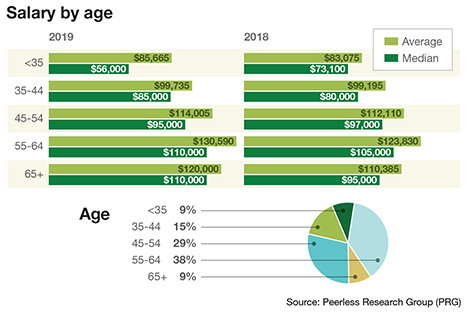 Pankow, age 21, has already been charged with two major projects at Mohawk. After completing a warehouse door-staging assignment for intermodal operations, he was assigned to optimize another warehouse without expanding its actual footprint. “This was a $7 million job that required the purchase and installation of new racking,” he explains. “I had to manage the financials and see the project through its completion—a very satisfying experience.”
Pankow, age 21, has already been charged with two major projects at Mohawk. After completing a warehouse door-staging assignment for intermodal operations, he was assigned to optimize another warehouse without expanding its actual footprint. “This was a $7 million job that required the purchase and installation of new racking,” he explains. “I had to manage the financials and see the project through its completion—a very satisfying experience.”
Kurt Steiner is the global transportation manager for Smith & Nephew in Memphis. His company is a British multinational medical equipment manufacturing company headquartered in London. A 30-year industry veteran, he joined the company one year ago to help navigate freight transportation in an environment of new worldwide complexity.
“Because we have manufacturing plants in both the U.K. and the EU, planning for Brexit has been especially important,” says Steiner. “We’re also watching how the U.S.-China trade agreements will play out. So, managing a carrier base for any kind of deployment today is a complicated matter.”
The key attribute for today’s logistics manager, says Steiner, is keeping a positive attitude while continuing to stay challenged. “If you don’t like change or disruption, you’re in the wrong business,” he adds.
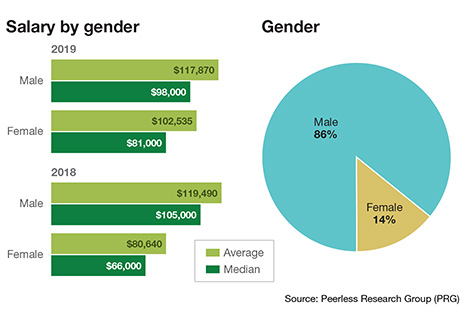 We also spoke with Melissa Point, an assistant supply chain manager for Ezaki Glico, USA, a Japanese confectionery company. She works in the company’s office in Irvine, Calif. “When I first began my job here, I was hired on as a supply chain management specialist, and I was strictly processing purchase orders and assisting on the back end with sending import notifications to the warehouse for our inbound shipments and containers,” she explains.
We also spoke with Melissa Point, an assistant supply chain manager for Ezaki Glico, USA, a Japanese confectionery company. She works in the company’s office in Irvine, Calif. “When I first began my job here, I was hired on as a supply chain management specialist, and I was strictly processing purchase orders and assisting on the back end with sending import notifications to the warehouse for our inbound shipments and containers,” she explains.
Point has been with Ezaki Glico a little over two years, having previously worked for a domestic appliance manufacturer doing business with China. During her five-year tenure, she was promoted to warehouse manager/logistics supervisor. Today, she continues to take courses in logistics and supply chain management where she can compare notes with other women in the industry.
“If anyone asks for my advice,” says Point, “I tell them that if you’re looking to learn at a fast pace and keep up in a forever growing field, this is a great place to be. If you don’t like change at the drop of a hat and lots of communication, then this is not the field for you.”
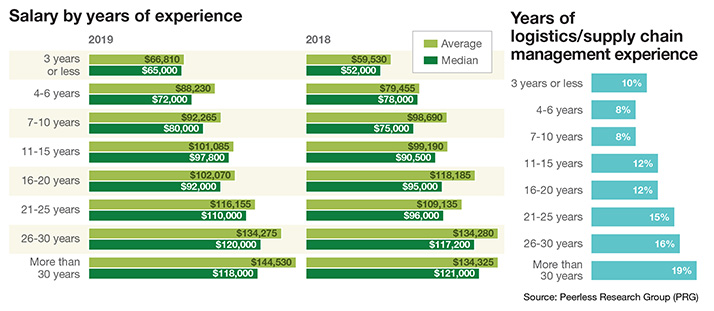
Learning curve
If anyone understands the urgent need for open communication logistics it’s Tisha Danehl, vice president of the executive recruitment firm Ajilon in Chicago. She notes that young people are far more proactive than earlier generations, and that they are taking charge of their careers from the very start.
“While particular salaries vary by role, the Logistics Management salary survey reflects the talent shortage that’s prevalent in the industry,” says Danehl. She notes that the U.S. Bureau of Labor Statistics estimates that jobs in logistics and supply chain will grow by 26% through 2020, and with the unemployment rate dropping to 3.8 in February 2019, the industry is growing faster than workers can be educated and recruited.

“As demand for top talent increases, finding candidates with the right skill sets in logistics will continue to be a challenge in today’s tight labor market,” says Danehl. “Companies need to understand that while no one candidate may have all the deep technical expertise within the supply chain, identifying those candidates who demonstrate soft skills, like adaptability and openness to learning new skills, is essential.”
She adds that social media—particularly LinkedIn—is being used in a variety of ways throughout the recruiting process in all industry, particularly in light of data that shows approximately 76% of Gen X workers use some level of online resource in career development.
“From providing detailed job previews to sharing insight into on-boarding processes,” says Danehl, “social media has become an invaluable tool to reach candidates and build the talent pool, especially in logistics and supply chain since it’s become so technology driven.”
Danehl maintains that social media can also be a powerful tool to help existing employees learn more about and buy into your organization’s mission and values. Through this, employees can become brand ambassadors and share what makes working for your company great—promoting benefits like flexible workplace arrangements, career development opportunities, and health and wellness programs.
“Employee brand ambassadors share valuable testimonials, and in many cases, recruit on your behalf,” adds Danehl. “In this labor market, companies need to be tapped into the way their prospective talent searches for jobs. Social media can be a great way for candidates and companies to engage.”
Knowledge is power
 Michael Gravier, associate professor of marketing and supply chain management at Bryant University, observes that “knowledge is power” in this career field. “For instance, those survey respondents who rated themselves more knowledgeable about e-commerce and e-fulfillment earn greater salaries,” says Gravier. “The data is very clear.”
Michael Gravier, associate professor of marketing and supply chain management at Bryant University, observes that “knowledge is power” in this career field. “For instance, those survey respondents who rated themselves more knowledgeable about e-commerce and e-fulfillment earn greater salaries,” says Gravier. “The data is very clear.”
He also observes that industries that embrace the newest advances in supply chain technologies will create more job descriptions for logistics managers. This in turn, will launch and develop different career trajectories. “Younger workers should consider getting a job in the right industry to position themselves for greater future success as fewer companies garner increasingly greater profits,” he says.
Finally, Gravier has this advice for companies seeking to rebuild their logistics departments: “Smart companies will generate more satisfied and functional workers by focusing on decision-making and operational processes that are professional, fair, and based on common sense. Avoid blindly following metrics or rigid guidelines, which are practices that deprive your logistics managers of a meaningful role—and also deny your company of the benefit of their judgement and adaptiveness.”
About the Author
Follow Robotics 24/7 on Linkedin
Article topics
Email Sign Up

















